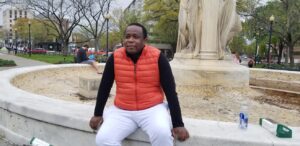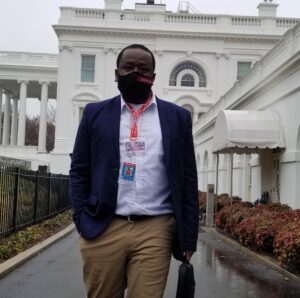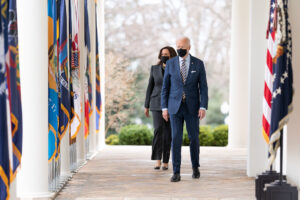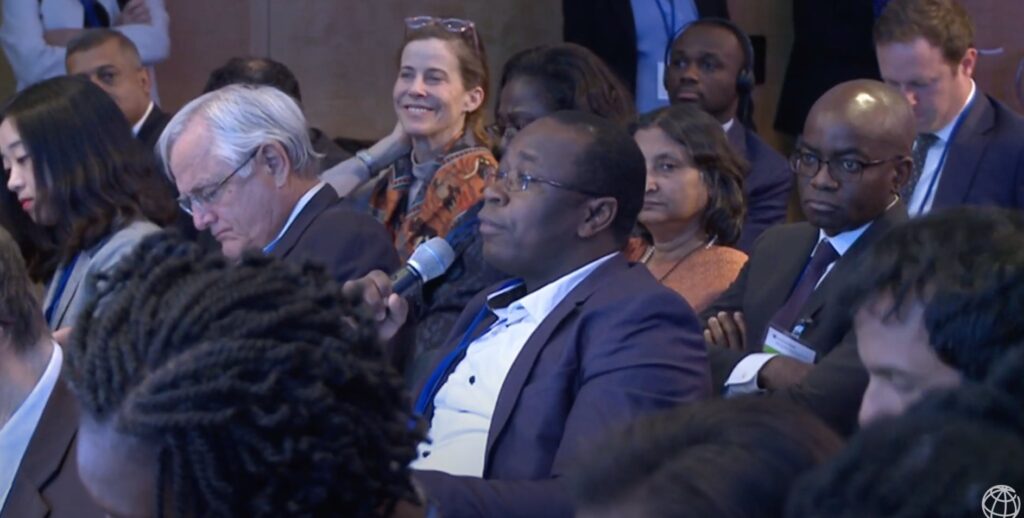Former Senior Correspondent of The News Magazine now Founder and Senior International Correspondent of Today News Africa based in Washington, Simon Ateba in this interview with Lekan Otufodunrin speaks on what it has taken him and his team to build his international publication focused on U.S.-Africa ties, requirements for a successful online publication, how to remain relevant in the present dynamic media landscape and other issues.
Your relocation to the United States came as a surprise to readers of your former website and social media followers. Tell us what informed your decision?
Thank you, sir, for the question. It’s a real honour to be interviewed by you, Mr Lekan Otufodunrin. What a hell of a journey I have had! I can still remember like yesterday the first time I landed at the Murtala Muhammed International Airport in Lagos in 2003 coming from the French-speaking part of Cameroon to learn English and go to college in Nigeria. I can still remember how I did not understand anything people around me were saying in English. I can still remember vividly how I sat down for my first class in English, and how we were taught to pronounce the word “church.” The lecturer was a “born-again-Christian” woman who also invited us to her ‘Winners’ Chapel’ church in Ogun State after teaching us to pronounce the word “church.” I can still remember how I got a job at a cybercafe in Agbara town. I can still remember how I would stay there all day long, helping customers to browse the internet and type their emails to family and friends.
As years passed, I can still remember how I began to go to the ‘Youth For Christ’ office and I would stay there all day long. I remember that everyone would go to school, and I would be the only person there until everyone returned from school. I can still remember how I thought my dreams were doomed and how I felt life was passing me by. I remember how the leader of Youth For Christ, a man called Shola, would call me to his office and tell me that even if I did not achieve anything else in Nigeria, at least I should become a born again Christian. It was that bad. But then, one day, I read a scripture that said dry bones shall rise again. It’s in the Book of Ezekiel 37 in the Bible. I began to rise again and turn my life around. By the time I had those followers on social media and those readers on our former platform, I was already granting interviews, appearing on TVC and Channels TV and other television networks in Nigeria. Those followers did not know my journey, my story. They just knew a successful reporter who was travelling across Nigeria, writing good pieces and fighting for the poor, the voiceless, the neglected, the refugees, the trafficked Nigerian girls. But, they did not know what was behind my motivations, my passions. The only thing constant in life is change. After fighting for the poor in Nigeria for almost 10 years, working for TheNews Magazine and P.M.News, it was time for me to embark on another journey in 2017, this time, to cover the most influential presidential building in the world – The White House, in Washington D.C.. Wow! It took 14 years! What a life! The short answer is, it was just time to move on and I made the move, especially after I was arrested and detained in Cameroon while investigating the living conditions of Nigerian refugees in Chad and Cameroon.

Not many African journalists who relocate to the US or other developed nations are able to continue to practice the profession. How did you overcome the challenges associated with being a media entrepreneur in a foreign country with various tough regulations?
This is really an interesting question. Many African journalists who travel to the United States become Uber drivers or work at restaurants, which is not a bad thing to do since it allows them to pay their bills. But it’s also a waste of talent, knowledge and a huge loss to the profession of journalism. To be honest, virtually no one succeeds in journalism here coming from another country. First of all, you come with limited knowledge of the language, the history, the environment, and with limited resources. All the money you arrive with is all gone in one week. Often, with the standard of living so high, most people become homeless or live in crowded rooms with many other people. Where do then find the time then to write, to think, to investigate, to plan, to interview, to get all the accreditations to cover real beats from the White House in Washington D.C. to the United Nations in New York? Where do you get the resources to take care of yourself? How long does it take for you to even get a work permit and begin to legally practice your profession? It’s almost mission impossible. Most people just give up and take a job and pay their bills. Most never return to the profession. As the years pass, it’s too late to start all over again. This is just for a journalist who would like to find a job and write for American newspapers.
To start your own media house, you face additional hurdles. You need to be registered and also protect your brand name. You need lawyers to guide you and to do that job for you and you need to pay them. Then, you need to build a team and have people doing different things, from the editorial team to the research team and staff members. It’s mission impossible. Once you have received your work authorization and registered your company and formed a team, you also need to receive various accreditations to cover various beats. In each of those places from the State Department to the Pentagon, the first thing you need to prove is that you are in the country legally, then that you are authorized to work in the United States, and then that you are authorized to work as a journalist in the United States, and then you work for a media house, and that you have recent articles that can be verified. All these things do not guarantee that you would be given accreditations. That’s just the basics. And so, with limited resources coming from Africa, broke, hungry and with limited mastery of the language and the environment plus all other problems, no one succeeds in the profession of journalism here coming from a different country. That was until I showed up. And I successfully completed all those steps, registered our company in the District of Columbia and began to cover beats. It was hard. But I fought hard. And now, I have built a successful media company that has been quoted by The Washington Post.
In one of your recent Facebook quotes, you wrote that ” some people chase dreams, I make mine come true!” Tell me about what your dreams are, or were and how you have made or making yours come through.
Yes, as I said in the previous answer above, I have successfully built what my team and I describe as Africa’s best media publication. Our focus is U.S.-Africa ties. We do not focus on Europe or Asia. We focus on stories in the United States that affect Africans and Africa and stories in Africa that affect Americans or America. That’s just it. That means at the White House, for instance, we would ask Press Secretary Jen Psaki about U.S.-Africa ties under the Biden administration, or we would ask President Biden himself what his U.S.-Africa policies are in the areas of security, trade, health, COVID-19, education, culture, and so on. Those are our best stories. But we also focus on what is happening in the United States as decisions that are taken here affect Africans who live here. We have a huge readership in the United States since there are millions of Africans who live and work here.
Tell me more about what was involved in successfully building Today News Africa (todaynewsafrica.com)?
Our publication, Today News Africa LLC is registered and headquartered in the District of Columbia, the capital of the United States with only 700,000 residents but almost 200 embassies. It is home to the U.S. government, the White House, the State Department, the Pentagon, the U.S. Chamber of Commerce, the World Bank and the International Monetary Fund. Our website is todaynewsafrica.com. Our focus as mentioned above is a focus on U.S.-Africa ties in various areas. For a local story in Nigeria to become big news for us, it has to be a story that affects U.S.-Africa ties, what the U.S. Mission to Nigeria is doing, how American companies are investing, how American drug manufacturing companies can help with COVID-19 vaccines, how the top U.S. companies in Nigeria are. Things like that. But, also, very high-profile stories in Nigeria that will interest the international community and Nigerians in the United States. This is because every African country already has journalists focusing on their countries, the intrigues, the politics, the accidents and all their local stories. As an international publication, we focus on the big picture between the United States and the continent of Africa. A businessperson would say that we focus on the mutual interests of the United States and the continent of Africa. Full stop.
How did you pull through with having the new writing and webmaster fellows on your team that have enhanced your coverage and operations?
My colleague Kristi Pelzel, who is our director of global communication, handles the fellows and staffing. She has a master’s degree from Georgetown University in Washington DC. She’s very good at her job and also supervises our YouTube Channel. She conducts high-profile interviews with key actors in Africa and around the world, from South Sudan to Nigeria. She’s the number 2 in the company and takes her job very seriously.
Many journalists who have launched their own online publications are barely managing to sustain their operations. What should they need to know about running a successful online platform?
It’s a tough environment, and it’s even tougher in the United States as you can imagine. I would say that the first thing is to define exactly what your focus is. As described above, our mandate is clear, our focus is clear, our scope is well defined, and when I raised my hand last week to ask a question to the IMF Managing Director Ms Kristalina Georgieva, she knew I would ask her about Sub-Saharan Africa. When I had an exclusive interview with her weeks ago, she knew and her staff knew it would be about Africa, from Ethiopia to Nigeria and elsewhere. Before our publication, only Reuters, Bloomberg, Financial Times and the rest would conduct such an interview. And you would not blame the IMF. The African journalist in Ghana may not be following it every day, attending the briefing, read all the literature and conduct an interview with people there daily. They may not also have the continental understanding as they just focus on their own country.
Have you been able to address the imbalance in reporting Africa as much as you will want to and what is your advice for major media networks on how to report after better and fairly?
I have made some progress, but it is not enough. As we get more resources and employ more staff, our reach and scope will expand. We need more reporters in Africa that we can train to identify what our audience cares about.
What is your general advice for journalists and media professionals on how to remain relevant in present the very dynamic media landscape globally?
To remain relevant internationally, you need to upgrade yourself. You need to up your game, you need to be able to attend the same press briefing with the journalist at the New York Times and ask a better question than them. You need to understand that online is the new reality. No one waits for news tomorrow. It’s all happening now, and it has to be published as it happens. You may do a follow-up story, a bigger story, or bring new perspectives into the story, or investigate a story for weeks or months, but you need to be relevant today for that big story to be read tomorrow. And because online is where it happens, you need to take advantage of all the resources, build your team to work remotely, using platforms like Slack to write articles, share business ideas, hold meetings and do video calls. You also need to have a social media presence, a LinkedIn page, a Facebook profile, a Twitter handle, and other platforms. You also need to learn how to conduct an interview via Zoom, and how to record them, edit them and publish them on YouTube or your platform. But also, you need to have an international passport and travel for conferences and world events. In addition, you need to attend training at home, know how to access resources, how to get in touch with newsmakers and sources of news. You also have to follow me and follow others who are already doing what you may want to do tomorrow. I can go on and on, but those are a few tips, tricks and hacks that you can use.
How lucrative is online publishing or what are the ways to earn revenue based on your experience?
This is really a great question on many people’s minds. How do you make money publishing online? And I will be as honest as possible here. In the beginning, you would need a lot of support. If you do not have it, there is no way you can sustain yourself in the United States and build a business. A one-bedroom apartment in Washington DC will cost a minimum of 500,000 Nigerian naira per month. How do you pay for the first month? the next month? and the next year, if you have no income coming in? Which is what happens at the beginning. The standard of living is so high that when I go to eat egusi soup or amala, a Nigerian dish, I pay about 20,000 Nigerian naira per plate, and the quantity and quality are far below what you get in Nigeria for 150 naira. So in the beginning, you would need a lot of support. But how do you get the support? The problem is you cannot get that support if 1. You have not built a publication that is known and respected in the community 2. That is up to the American standard in terms of its appearance, content, style, language, ethics and popularity. It’s just like catch-22! In addition, you cannot afford to pay people for services.
For instance, you cannot afford to hire people to build your website, manage your search engine optimization, increase the website’s speed, and all other technical aspects a website requires. People here are paid by the hour. For someone to have a meeting with you for three hours and discuss your website, you may end up paying them $300. For them to look at the website and begin to work on it, you have to pay them by the hour. Also, to retain an SEO company to manage your SEOs, you may have to pay a minimum of $2000 per month. How do you afford that when all you had coming from Africa maybe a thousand dollars? It seems doomed from the beginning. Finally, to build a team and have people writing articles for your publication, you also need to pay them by the hour. How do you pay for that? You will also need lawyers, and an accountant to track expenses and income and set taxes aside so you do not have problems with the IRS. That’s why no one does what I have done. That’s why you hardly have an international African publication, which is what we are building. To make money, we rely on grants, subscriptions, Google Adsense, donations and various other forms of publications. Advertising in the United States is really expensive, but you need to be well respected, registered, branded, read and connected to begin to attract those funds, which does not happen at the beginning. We thank God for those who have supported us. We may no longer have some basic problems of survival, but we are not there yet. We still need support from various quarters and we know that we are getting there.
During your first participation in the Biden White House briefings, you wrote that some reporters who were there looked at you with some curiosity. “Like who’s this guy with his Today News Africa face mask? I said nothing. I need to write a book.”, you wrote, what will the book be about?

Yes, reporters at the White House are really amazing people. It’s teamwork but people were curious because they had never seen me and there, I was following them to the office of Vice President Kamala D. Harris. It was my first day and it ended well. My book would be read around the world. First of all, covering the White House is like covering an entire planet. To be honest, there is no other beat like the White House. That alone can be a book. But the book I would be writing would be about going from a dark room in Ketu area of Lagos without electricity to covering the most powerful house in the world.
While waiting for your chance to get picked to ask a question during white house briefing and add an African voice to the white house as you want to, what questions would you like to ask Biden or the VP if you get a chance?

Foreign policy under the Biden-Harris Administration has been dominated by immigration in the southern border. That’s the border between the United States and Mexico. And although President Biden has told world leaders “America is Back,” not much has been done when it comes to U.S.-Africa ties. When the president held his first White House Press briefing recently, Africa was not mentioned, and no question was asked about Africa. But, now that my colleague Kristi Pelzel and I have been cleared for hard passes, we will be asking a lot of question about U.S.-Africa ties in various areas. President Biden has vowed to defend human rights and democracy around the world, however, in our recent interview with Amnesty International, we were told that although the president has taken the initial first right steps and has set the right tone, so much has to happen to rebuild America’s influence in the world and achieve the president’s set goals.
Any other insight you would like to share with our readers?
Yes, to read us on todaynewsafrica.com, follow us on LinkedIn.com/company/todaynewsafrica, facebook.com/todaynewsafrica, twitter.com/todaynewsafrica and youtube.com/todaynewsafrica.

